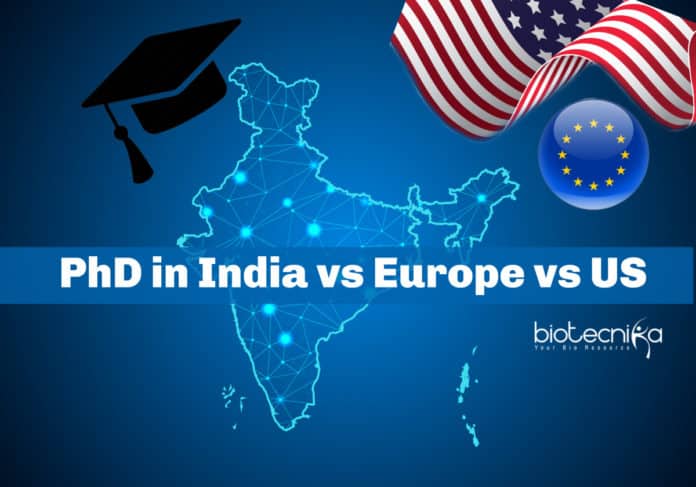Ph.D. in India vs Europe & US – Best Country for Pursuing PhD
If affixing doctor ahead your name is a long-lived dream or you have a desire to enter into research to make inventions, then having a Ph.D. degree is mandatory for you. One may consider it as an introductory chapter to the book of independent research. A doctor of Philosophy is the highest university degree conferred completing a course of study. In most countries, Ph.D. remains a fundamental requirement for someone who wants to enter a career in academics also. Undoubtedly the requirements for doctoral degree vary immensely between different subjects, universities states, and countries. At some places, the doctoral degree includes only research whereas at other it may include following a specified syllabus, classes, exams or even taking undergraduate classes. In this artcile, we will discuss the pros & cons about which country is best for pursuing Ph.D. – Ph.D. in India vs Europe & US.
Ph.D. In India
Considering India to get a doctoral degree?
The rising standard of higher studies in India and the growing costs of study programs across foreign countries is prompting more of the Ph.D. aspirants to chase their aspiration in India
.The Indian doctoral program is an intense, advanced research qualification constructed for students who have completed postgraduate courses or in some cases undergraduate courses where there is a provision of the integrated Ph.D. program.
What qualification you should carry to initiate your dream career?
Master’s program is the minimum requirement to infringe into the Ph.D. program. Although an engineering student completing four years of course studies is also eligible to apply for a Ph.D. right after obtaining B. Tech degree.
An insightful quote says: “Carefully observe the way your heart draws you and then choose that way with all of your strength”.
Thus it becomes substantially essential to consider all the pros and cons of considering Ph.D. in India before you actually decide to invest your crucial years of life into it.
Pros of Doing Ph.D. in India
- Unsealing a plethora of career options!
- Completing Ph.D. extends niche of career search in India which remains constricted after doing only graduation or post-graduation.
- Opt between regular or part-time Ph.D.Candidates in India aspiring for Ph.D. have the privilege of having two options in their hands:
Full- time: With an average completion time of 5 years in Full-time stream type student needs to bestow full time to research work attending the lab regularly.
Part-time: With an average completion time of 6-7 years in Part-time stream student devotes only a part of their time to Ph.D. usually working as a regular employee somewhere.
Career options after Ph.D.:
In academics one may consider the following options:
- Research assistant
- Postdoctoral fellow
- Lecturer/ Professor
- Ph.D. supervisor
- School Teachers
Non-academic options may include:
- Food / Pharma /Beverage Industry
- Scientific writing
- CROs
Worrying about the fee?
- This may sound exhilarating to the candidates all over the world, considering India for doctoral studies is quite pocket-friendly. Hence, India could be a reasonable destination to Ph.D. aspirants indeed.
- Depending upon the subject chosen or one chooses a private or State University, budget of Ph.D. completion varies. Regardless of this fact Ph.D. expenditure is very less in India as compared to international standards.
- Fee structure comprises of USD$ 1,000 per year or even less (exceptions are few private universities). Admission and registration fees are also very nominal.
Ph.D. Funding is promising! - One can get the choices under various schemes for funding the Ph.D. Project.
- Nowadays government organizations like CSIR, UGC, DST, ICMR, IITs are coming up with new ingenuities to boost the quality of research in India.
Junior research fellowship-CSIR
- Council of Scientific & Industrial Research (CSIR) is a foremost national Research & Development organization, is among the world’s largest publicly funded R&D organization. CSIR conducts NET (National Eligibility Test) twice in a year and offers lucrative scholarships to those candidates who qualify it with top ranks in addition to providing eligibility for lectureship in Government or private universities/ colleges anywhere in India
Junior Research Fellowship-UGC
- University Grants Commission in India is the official body set up by the Indian Union government under the Ministry of Human Resource Development ensures the maintenance of standards of Higher Education. UGC also offers scholarships for Ph.D. followers if they get to pass the qualifying exam in relevant subjects.
There are many other fellowships/scholarships which are offered by other government organizations like:
- ICMR fellowships awarded by ICMR(Indian Council of Medical Research)
- JRF awarded by DBT(Department of Biotechnology)
- Prime Minister’s Fellowship awarded by DST (Department of Science and Technology)
Cons
- Check for the organization’s repute!
- Fake Ph.D. is budding like a menace in India. You need to remain vigilant while selecting the university or organization for pursuing the Ph.D. program. Check the genuineness of the institute and never offer money to anyone for getting enrolled for a Ph.D. program.
- Oversupply of PhDs! – This may sound unpleasant to hear but for India, the second-largest populated country in the world, huge numbers of Ph.D. degree being awarded, thus the competition tends to be very high.
Moving ahead in this article – Ph.D. in India vs Europe & US – We will focus next on the pros & cons of doing PhD in Europe & the United States.
________________________________________________________________________
Thinking of Pursuing Ph.D. Degree Abroad?
You may choose to land up into the United States of America or Europe to shape up your Ph.D. dream into reality. Certainly before doing that you must consider all the pros and cons of making your choice of destination.
Ph.D. in Europe
A common system for university degrees is followed by European Higher Education Area (EHEA) which consists of 28 EU members majorly Austria, Belgium, France, Finland, Germany, Ireland, Italy, Netherlands, Spain, Sweden, Switzerland, Turkey, and the United Kingdom.
The bologna process, an agreement between European countries to ensure compliance with the standards and quality of higher education qualifications was signed in 1999 at the University of Bologna. It follows the basic framework of academic degrees which has been distributed into three cycles which use The European Credit Transfer and Accumulation System (ECTS):
- Each credit signifies a certain amount of learning hours for a course. A year of study usually carries 60 credits.
- First Cycle: Award of Bachelor’s degrees with three years with a minimum of 60 credits per academic year (typically 180-240 ECTS)
- Second cycle Master’s degree with two years with a minimum of 60 credits per academic year (typically 60-120 ECTS)
Pros of Doing a Ph.D. in Europe
- Ph.D. is recognized across all the countries under EHEA!
- The biggest advantage of doing Ph.D. from Europe is the doctoral program being a part of the Bologna Process will be considered by all the universities and employers across all the countries of Europe.
- Invested number of years could be less!
- The time required to complete a doctoral degree is providentially less in European countries as compared to the USA or in India as Ph.D. programs are shorter.
- In European countries like Germany, Norway France or the even the United Kingdom, the Ph.D. degree takes three years to complete much shorter than the average span of six years in the US or five years in India.
- The topic of the thesis! – In European countries, the Ph.D. topic is chosen and is assigned to the individual based on the project snarled to the particular guide he wants to join as research follow. He must write a research proposal with the application for which he must seek advice from the potential supervisor as a topic of research should be from the supervisor’s domain only.
- No coursework is a privilege! – Candidates aspiring for a Ph.D. program in European countries can initiate their research work from right from the moment they join as they have no or very less course work.
- Tuitions fee is trivial! – Ph.D. candidates possess the benefit of having a low tuition fee unlike high tuition fee for those pursuing Ph.D. in the US. An average tuition fee for a Non-EU/EEA student is US$ 4,500 – 18,000 per year.
- Getting Salary simultaneously is an advantage! – Now if one gets an extra penny in his pocket while doing a Ph.D., it is absolutely like a cherry on the cake. In many European countries, work contracts are provided to the candidates during their tenure in research work. They pay into health insurance and even unemployment insurance as employees. Nonetheless, in countries where students don’t get the outlook to work as an employee, they are proficient to apply for university scholarships, research grants, and external fellowships.
- No pressure of qualifying exams! – If one opts for European Ph.D. program he is waived off any qualifying exam to consummate his work. However, in few countries like Sweden candidates have to appear for oral and written exams after completing half of their Ph.D. tenure.
Cons of pursuing a Ph.D. in Europe
- Bachelor degrees are not considerable!
- Not exactly could be considered as a disadvantage but unlike the US, Master’s degree is the minimum requirement to step into European doctoral program.
- Getting a teaching experience is out of reach!
- European countries do not offer many privileges to candidates who are interested to obtain teaching opportunity along with research work. Some countries may allow that but then it is not a requirement of Ph.D. curriculum.
________________________________________________________________________
PhD in US – The United States of America
Pros of pursuing PhD in the United States
- Bachelor’s degrees are welcome! – Bachelor’s degree is the minimum requirement to obtain a degree from the United States of America for all PhD programs though Master’s degree may be required for certain courses.
- Undergraduates enjoy an advantage over postgraduates that they may get their master degree while doing Ph.D. only for which they are required to accomplish certain course work or may clear few specified exams.
- Prospects of having teaching experience! – To take undergraduate lectures as teaching assistants remains part of the Ph.D. curriculum as it is one of the clauses in funding package. Managing tutorials or contributing in preparing exam exams papers to sustain to be part of their course. As a teaching assistant most Ph.D. students are expected to effectuate a semester for one class for a duration of two to three years.
- You may draw Extra emoluments! – Although tuition fees are high for private American Universities and even in Public universities for international students, the extra-economic aid may be grabbed in the form of five-year funding packages including tuition fee and a monthly stipend.
- Some universities offer their individual fellowship program to fund PhDs apart from those offered at the state or national level.
- Teaching may also support the students financially by providing teaching assistantships partially covering the tuition fee.
Cons of pursuing a Ph.D. in the United States
- Time concern! – For fetching a Ph.D. degree in America one may have to give as long as eight to ten years on maximum with an average of five to six years though. Even students who have completed their masters have to cover the same number of courses as those who are undergraduates only.
- Ph.D. cost can vary in between 28000$ to 40,000 $ per year although the university one considers brings a difference to this amount.
- The topic of the thesis! – In the US, candidates aspiring for Ph.D. need to apply to a department of choice rather than a particular Ph.D. project. Once they get admitted to the department’s Ph.D. program they need to wander in between different labs for a time period of a year or so before they could actually choose their mentor or research project. Thesis topic may get fixed in the third or fourth year of doctoral research.
- Putting a hand on lots of Course work – Candidates aspiring for American Ph.D. program nonetheless of the previous experience have to varnish two to three years of courses along with seminars within their dissertation domain.
- Passing the qualifying exams becomes mandatory! – The US has established the criteria for clearing the qualifying exams before commencing with core dissertation work. This is basically done to authenticate the candidate’s knowledge over the discipline chosen for the study. The qualifying exam consists of an oral and written part in addition to an oral presentation of the research topic. Completing the coursework and qualifying exams provide the steering wheel to the Ph.D. main course dissertation work.
- The dropout rate is distressing! – In the United States alone on an average approximately 40 % of students drop out in different disciplines based on the data obtained by analysis done to find the successful completion of Ph.D. after 10 years of beginning. Maximum students escape in the second or third year of joining.
Long-time duration, lack of clear structured support system initially, the burden of the qualifying exam and course studies, disagreement with the mentor, heavy expenses and often unemployment for all those years may lead to Ph.D. attrition.
Too often students with moonstruck eyes dreaming for Ph.D. plunge into the Ph.D. programs in various countries without precisely peeping into what Ph.D. programs in different countries entail. This article – Ph.D. in India vs Europe & will help you to review the advantages and disadvantages of opting India, Europe or America for pursuing Ph.D.
It is rightly said, “A journey of a thousand miles begins with a single step”.
Nevertheless, if you are deciding to invest years into making your dream career alive, it becomes immensely momentous to pick up the step in the right direction.
 is an ]experienced faculty at BioTecNika with a keen interest in keeping herself motivated to learn new and more. The above article on 3D Bioprinting is one such example of her deep knowledge of trending innovations in life science & medical field. She has expertise in Biotechnology and Microbiology and completed her Ph.D. in Biotechnology. Dr. Nidhi has also been awarded at several workshops and conferences and has publications in reputed international journals. In this artcile, she discusses the pros & cons of Ph.D. in India vs Europe & US
is an ]experienced faculty at BioTecNika with a keen interest in keeping herself motivated to learn new and more. The above article on 3D Bioprinting is one such example of her deep knowledge of trending innovations in life science & medical field. She has expertise in Biotechnology and Microbiology and completed her Ph.D. in Biotechnology. Dr. Nidhi has also been awarded at several workshops and conferences and has publications in reputed international journals. In this artcile, she discusses the pros & cons of Ph.D. in India vs Europe & USKeywords: Ph.D. in India vs Europe & US, Ph.D. in India, Ph.D. in Europe, Ph.D. in the USA, Best country for Ph.D., Top country providing Ph.D. degree.







































This is really helpful. Please also mention about:
PhD in Canada and Australia.
Which country (USA or UK or Other European Countries or Australia or Canada) is better fr studying Masters?